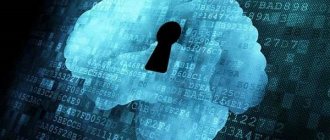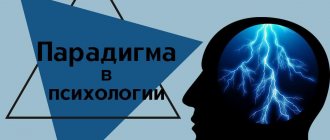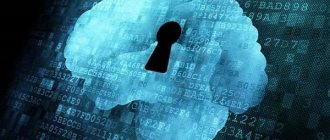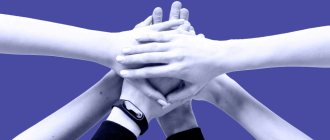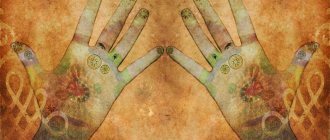In this article we will tell you:
- The concept of reflection in psychology.
- Functions of reflection.
- Types of reflection in psychology.
- Examples of reflection in life.
- Features and stages of development of reflection.
- Wrong reflection.
- 4 methods of reflection in psychology.
- 6 final recommendations for developing reflection.
Reflection in psychology is an extremely important concept, because it is on this quality of a person that the level of development of his personality and the ability to cope with difficulties depend. Without being able to realize and analyze our inner state, it is difficult to express ourselves in the world, because without knowing ourselves, without understanding our own motives, thoughts, feelings, needs, we will not learn to hear and understand the people around us.
Our article will tell you in detail what reflection is and what its role is in a person’s life. In addition, at the end of the material you will find practical recommendations and interesting exercises for its development.
The concept of reflection in psychology
The ability of self-knowledge, conscious analysis of one’s thoughts, emotions and behavior, assessment of the correctness of decisions made and goals set is called reflection. The word comes from the Latin “reflectio” - “reflection”. Reflection in psychology, in short, is defined as an internal appeal to oneself, assessment of one’s personality and analysis. To reflect means to look inside yourself and evaluate the feelings you are experiencing, your own self, rethinking what is happening.
Ancient philosophers, such as Socrates, believed that reflection is a method of self-improvement and self-knowledge accessible to everyone. Reflection in modern psychology is defined as a process of deep cognition produced by the subject in relation to his internal mental states and their course. Attention is mainly directed to observing the work of one's own soul, as well as assessing the level of spiritual maturity of the subject.
Children do not have reflection skills, since this quality is a consequence of education and self-awareness. It appears only when a teenager begins to evaluate himself as a person and thinks about what his internal qualities are. Reflection requires mental labor and only thanks to it can it pass through the stages of its development. If there is no internal work, then even an adult will not achieve a sufficient level of development of reflection. Therefore, some adults even in adulthood show infantilism.
The driving force behind the development of reflection is the desire to observe oneself, one’s mental reactions, and direct attention to ongoing intrapersonal processes. Of all living beings, the ability to reflect is inherent only in humans.
There are different ways to reflect
To date, 7 types of reflection have been identified:
- Communicative – allows you to solve problems that arise when interacting with society.
- Personal – used when there is a need for one’s own cognition and correction of consciousness.
- Intellectual – necessary for finding different solutions to the same problem. This is the ability to think variably.
- Philosophical reflection is a tool for thinking about the meaning of life.
- Social – reflections on the topic “what other people think of me.” The ability to see yourself through someone else's eyes.
- Scientific – aimed at researching scientific methods, methods, theoretical justifications.
- In the psychology of communication, reflection is the knowledge and analysis of the interaction of individuals in society.
Reflection functions
Reflection allows us to see ourselves from the inside and influences our perception, while performing the following functions:
- makes it possible to get rid of unwanted and sometimes destructive thoughts;
- promotes awareness of one's strengths and weaknesses;
- reveals unnoticed talents and abilities;
- teaches you to control your own thoughts and actions;
- allows you to clearly understand the relationship between actions and their consequences;
- develops self-criticism;
- forms logical thinking;
- promotes self-organization;
- develops the skill of analyzing and overcoming complex problems.
Types of reflection in psychology
Reflection can manifest itself in various areas of human activity. Moreover, depending on the level of personal self-knowledge, it will differ in the nature of its manifestation.
Based on which area of mental activity the attention of consciousness is directed to, 5 forms of reflection are distinguished:
- Personal reflection is a form of understanding the inner content of the individual himself. In the process of this comprehension, the psyche performs emotional and evaluative activity. In this case, the analysis will be aimed at significant components of the personality: motives and needs, goals and ideals, abilities and opportunities.
- Logical reflection is the most rational form in which analysis is directed towards cognitive processes and identifying the characteristics of thinking, memory, and attention. This form of reflection is of great importance in educational activities.
- Cognitive reflection is also observed in the field of learning and cognition. At the same time, in contrast to the logical one, the purpose of its analysis is the content and quality of knowledge along with its compliance with the requirements of other people (teachers and lecturers). Cognitive reflection becomes an assistant in educational activities. It helps broaden your horizons, allows you to adequately assess your professional qualities and outline ways to successfully apply them in your work.
- Interpersonal reflection involves understanding and evaluating our relationships with other people, analyzing our actions in relation to others, and determining the causes of conflicts.
- Social reflection - in psychology, this means the process of a person’s awareness of the attitude of the people around him. Having analyzed the nature of their assessments, the individual seeks to adjust his behavior accordingly.
Reflection involves not only analyzing past and past experiences, but also predicting the development of events in the future. From the point of view of the temporal aspect of assessment activity, there are 2 types of reflection:
- Retrospective reflection is aimed at understanding events that have already happened in life. This is an assessment of one’s actions and deeds, the strengths and weaknesses manifested in them, victories and defeats. Retrospective reflection involves analyzing the reasons that led to good or bad results and determining conclusions for the future. This type of reflection is important for a person, because by analyzing our mistakes, we learn to avoid them in the future.
- Prospective reflection - in psychology it is defined as the assumption of the possible consequences of one’s actions and the assessment of one’s own capabilities as events develop in different ways. This type of reflection is used when planning activities or choosing the optimal way to solve problems.
From all of the above, it follows that reflection is an important mental process that allows a person, through internal analysis, to achieve personal growth and improvement. And this, in turn, will contribute to achieving success in his chosen areas of activity. Thanks to high-quality reflection, a person will eventually be able to be proud of himself, and not experience a loser complex.
Definition
The word "Reflection" is of Latin origin.
Literally speaking, it means “to look back.” In psychology, reflection is called introspection or introspection. They can be called synonyms. The definition of reflection is the totality of a person’s thoughts about his life and actions, as well as subsequent assessment of himself. A person is able to evaluate himself using communication mechanisms. For this reason, the existence of such a concept as reflection is impossible without communication.
Self-observation can be different:
- Ordinary reflection
- a person thinks about his actions, notices the mistakes he has made, but does not get hung up on it. - Deep reflection
- a person engages in soul-searching, analyzes his actions and the response of society. This includes reflections on the universe and moral standards.
Any human action can become reflexive.
For example, feelings, actions, words, impulses, emotions. They become reflexive if a person turns to his consciousness and tries to carry out introspection. Thanks to reflection, a person thinks and fantasizes, goes into the world of dreams and begins to feel like a part of reality. By creating a picture of an ideal world in his head, he begins to feel like a certain person and acts in society according to his attitudes.
Empathy - what is it, or is it easy to be an empath?
Examples of reflection in life
- Parents monitoring their child. It’s not for nothing that they say that children are our mirror. If a mother notes her own character traits or peculiarities of behavior inherent in her in her little son or daughter, then this is a form of introspection.
- Reading books. Analyzing the behavior of the heroes of the work, empathizing with them, trying on the situations described, approving or condemning the actions of the heroes is also an appeal to one’s inner world and an attempt at self-awareness.
- Regret after a quarrel, an apology. Controlling negative emotions, analyzing the reasons for their occurrence and finding ways to further prevent quarrels on a similar issue can also be called a manifestation of self-analysis.
- There are people who practice reflection every day as part of their profession. For example, these are teachers. Social reflection helps to evaluate relationships with students, analyze omissions, and find ways to improve. The ability to use reflection efficiently allows the teacher to improve his professional level and achieve mutual understanding with students.
Features and stages of development of reflection
The first stage of development of the ability to reflect occurs in early childhood, when the child turns 3 years old. This age is characterized by the fact that the baby begins to recognize himself as an independent subject of activity. He tries to determine his boundaries, what he can do and what he cannot do. At the same time, he wants to prove to others that he is also an adult, and often shows stubbornness and refuses to obey.
At this time, the baby has to learn the norms of social behavior and accept demands. “It is possible” and “not possible” are mastered by him at the behavioral level. At this age, a child cannot master either introspection, self-esteem, or, of course, self-criticism.
The second stage coincides with the beginning of educational activities and occurs at the age of 6-10 years. This period of life is accompanied by the development of reflection in the field of educational activities. At this age, the child develops the first skills of social reflection and elements of self-analysis.
Wrong reflection
Reflection in psychology is positioned as a therapeutic method of self-analysis. Properly constructed reflection leads to positive internal changes and personal growth. However, in order to get positive dynamics, you need to conduct self-analysis in compliance with certain rules, otherwise reflection can flow into self-criticism.
An experiment conducted by scientists among reflective students yielded interesting results. These students were found to have low levels of psychological well-being. As psychologist Tasha Evrich noted, it is not the process that is to blame for this, but the wrong approach to it.
Reflective people often become immersed in philosophical thoughts, concentrating on the question “why?”, when it is better to ask themselves another question: “what?” "What's happened? What I feel? What should I do to prevent this from happening again in the future and to alleviate my condition now?”
Other studies support this claim. For example, in one of the experiments, students were asked to reflect on a failed exam. Those who asked themselves the question: “Why did this happen?” concentrated on their shortcomings, scolded themselves for the mistakes they had made, and relived the failure. As a result, the depressed state did not leave them the next day.
It is always more effective to understand what to do than to figure out who is to blame. Doctors even have the term “destructive reflection.” It is typical for people with an inflated level of self-criticism. It is often used by patients with neuroses who are prone to continuous analysis of their thoughts, actions and behavior.
For example, here is a situation familiar to everyone: you are late with the deadline for submitting a report at work. After this, you can plunge into soul-searching and reproach yourself for a long time that you do not know how to prioritize your task list and plan your time. Then there is a small step left to draw a conclusion about your professional incompetence. And you certainly do it, at the same time remembering the always and everywhere late relative and deciding that genetics are to blame. Such self-reflection will not lead to anything good. You will lower your self-esteem, feel depressed, and lose motivation to take on a new task.
Gender approach
There is a theory of a gender approach to the process of reflection. According to this stereotype, it is implied that women are more prone to reflection than men, and this is supposedly due to the more subtle mental regulation of the weaker sex. This controversial claim has no scientific evidence to support it.
There are a number of observations by psychologists who note different manifestations of reflection in representatives of different sexes.
Thus, it has been found that women with a low level of reflection are more inclined to defend their own interests to the detriment of the interests of others. Simply put, low-intellectual, non-reflective female individuals are more scandalous and have a more quarrelsome character. Whereas reflective female representatives prefer to find a compromise and get away from a scandal than to be involved in a conflict.
A reflective man, on the contrary, in a conflict situation acts as a fighter defending his interests. Men with a minimal indicator of reflection will demonstrate adaptive, opportunistic behavior in a conflict situation.
So, to summarize the above, we can say with confidence that to reflect means to be a person who thinks, feels, and analyzes. This property of human nature distinguishes us from other representatives of the living world, and it is this property that can bring the human personality to a new, qualitatively different level of development.


